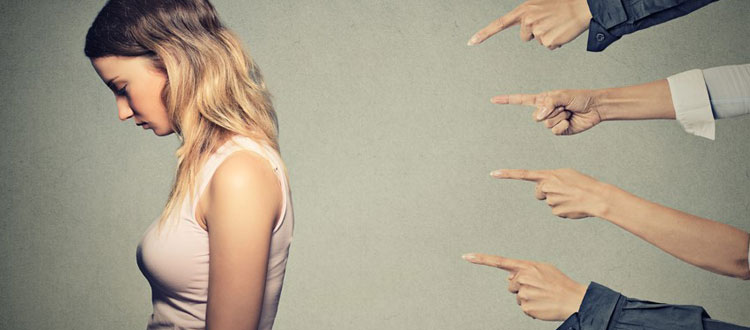The Disturbing Parallels Between Period Shaming and Slut Shaming
Companies profit from toxic, unnecessary products (like feminine wipes) when women feel they have a shameful problem to conceal. If we can’t talk openly and respectfully about periods, about our vaginas, and about our bodies—we’ll never convince policymakers to regulate the feminine care industry, or move major manufacturers to value our health. This guest blog from our No Secrets Business Partner, Lunapads illustrates how far reaching the problem of period secrecy and shaming is—translating to the shaming of women’s sexuality as a whole.
 |
| Christina Vanvuren Writer |
Raise your hand if you’ve ever felt personally victimized by period-shaming. Now, raise your hand if you’ve ever been made to feel like a “slut.” Chances are, if you raised your hand to the first, you also raised it to the second. People who have periods have been taught by society that their menstruation is dirty, shameful, and embarrassing. Those who freely enjoy sex – specifically women, or those perceived to be female – are made to feel that their sexuality is something that shouldn’t be proudly displayed, for the same reasons. Period-shaming and slut-shaming are deeply intertwined and only a true understanding of how they perpetuate each other will help bring an end to either one.
Period and slut-shaming both demand secrecy.
When I was 14, my friend’s older sister had her friend walk me home. He was 18, and before we got to my driveway, he kissed me. It was my first kiss and it didn’t feel right, so I told him to stop. Thankfully, he did. But he also told me not to tell anyone. This request for secrecy made me feel ashamed, dirty. It’s the same concept with periods. We’re taught by society, by marketers, and sometimes even by our own parents to sneak tampons in our pockets and bury our wrapped pads in the bottom of the trash can so no one will know that we’re menstruating. Secrecy of this kind breeds nothing but shame, more secrecy, and sometimes even violence, resulting in a vicious cycle that can keep us stuck in damaging patterns of embarrassment and guilt.
When I told my parents about the kiss, their reaction perpetuated the cycle. I was told I shouldn’t have put myself in that situation, shouldn’t have led him on, that they were disappointed in me. This unintentional slut-shaming made me feel like I did something wrong and deterred me from telling my parents about any other sexual encounters throughout my adolescence and into adulthood. I didn’t go to them for birth control, to tell them I lost my virginity, or to ask questions I had about my body. I also didn’t tell my mom when I had my period. I would sneak to the store and buy tampons. Why? I was ashamed.
We talk about both the same way.
“Ew.” “Gross!” “That’s disgusting.” We’re not supposed to talk about our vaginas – whether it be the monthly blood that flows out or the number of people we allow to have access. Around the same age that many girls get their periods, they also come to understand what the term “slut” means – and that it’s something they want to avoid being called. A study from Pennsylvania State University found that, starting in 6th grade, girls who have sex are more likely to lose friends, while boys who have sex gain them. It’s this kind of double standard that leads to girls (and women) being ashamed of their sexuality – much like they are ashamed of someone finding out that they’re on their period.
In the same study, researchers found that girls gained peer approval for making out with boys, but lost it for having intercourse, further perpetuating the societal construct that a fine line has to be walked between being not sexual enough and too sexual. The degrading language used around menstruation and sexuality is often very similar and, many times, undue correlations are drawn. For example, If a girl has a late period, she may be called out by her friends for being promiscuous (when in reality, many girls don’t have consistent periods for the first 2 years after starting their periods and late periods can be caused by stress, change in diet or other health factors). This kind of shaming is taught by the media, by parents, and most importantly, by the refusal of society as a whole to allow girls autonomy over their own bodies.
Period-shaming opens the door to slut-shaming.
From the time girls first go to the drugstore to stock up on tampons or pads (but seriously, ditch the disposables), they instinctively try to hide them under a magazine and hope that the checkout person isn’t cute, or worse, someone they know. The same goes for securing birth control or condoms – “What if someone I know sees me? What will they think of me? Why is this old man glaring at me?” Many girls would rather forego the embarrassment of acquiring menstrual products or protection that they forego it altogether.
More often than not, this kind of embarrassment is taught (usually unintentionally) at home. The fathers who joke that their daughters can’t date until they’re 25 are likely the same fathers who are too embarrassed to buy tampons at the local grocery store. The mothers who didn’t give comprehensive period talks are often the same mothers who tell their daughters that they shouldn’t need birth control because they shouldn’t be having sex. Our parents are most likely just teaching us what they learned from their parents. Media, schools, and friends also play a role in furthering the belief that what our bodies do – be it sex or menstruation – is dirty and something to be ashamed of.
If there’s one thing I know for sure, it’s that period-shaming flings the doors to slut-shaming wide open. If I had not been made to feel like my period was a repulsive, horrible secret that happened to my body each month, and that my feelings were less than valid if I was menstruating, I wouldn’t have felt that sex was something I should also hide, or that my feelings when I had sex weren’t as valid because, after all, I asked for it.
—————–
Author Bio: Christina Vanvuren is a freelance sex & reproductive health writer living vicariously through herself in Atlanta, GA. When she’s not championing for a world free from period and slut-shaming you can find her drinking copious amounts of coffee, traveling, and nurturing her friendships with badass women around the world. You can connect with her on Facebook, her website, or via email at write@christinavanvuren.com
Image Notes:
Shame image is stock, uncredited.



